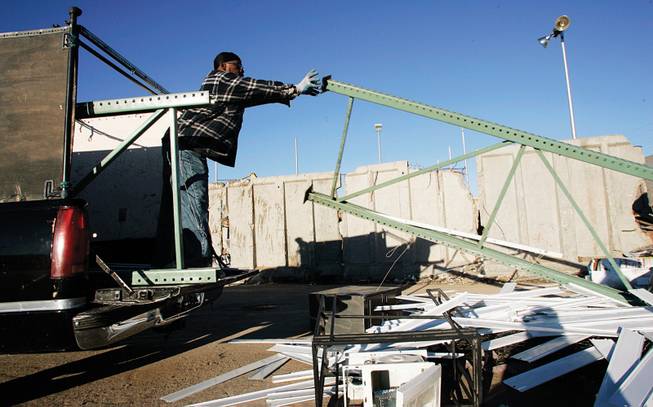
Gregory Dickinson, 50, empties his truck of scrap metal Friday at a local recycling center. Dickinson is one of hundreds of locals who rely on money from recycling to make ends meet. With less global demand for metal, the going rates for scrap, displayed on the board pictured below, have plummeted.
Wednesday, Jan. 14, 2009 | 2 a.m.
Sun Archives
- Priority No. 1: Finding a job (1-08-09)
- In down economy, shelters seeing more people in need (11-26-2008)
- Local hardship, sharp relief (11-25-2008)
- Little help for families down on their luck (8-12-2005)
Gregory Dickinson was scouting out Dumpsters in his 1988 Chevy Silverado last month when he discovered a load of metal shelves behind a supermarket. It would have been his lucky day — if it had been, say, August.
Since the global economy has gone into a tailspin, demand has dropped for raw materials such as scrap metal, driving down the prices paid for recycling those materials.
For Dickinson and hundreds of people in the Las Vegas Valley who depend on recycling, that means even less money in their pockets. Most of them live in poverty; some are homeless. These are people who were already at the bottom of the local economy. And now even the bottom has dropped out.
Dickinson, for example, lived on the valley’s streets for seven years. During that time, he sat through dozens of doctor and social service agency appointments, attempting to get Social Security to help him pay for operations on knee and back injuries that made it difficult to find steady work. He learned to live with painkillers and became resourceful at gathering what most people call junk, first in shopping carts and then in a series of old cars.
In the past year, the 50-year-old has had two operations and finally won Social Security Disability benefits. Those checks are for $867 a month. So he spends most of his time at his mother’s home, just southwest of Nellis Air Force Base. In her garage, he fixes and resells vacuum cleaners and fans that he has pulled out of trash cans. Out back, he stores steel, tin, copper, iron and other materials in assorted blue plastic barrels.
His goal is to be “one step ahead of the garbage man.”
A recent Friday afternoon found Dickinson methodically removing several dozen metal strips from a barrel and stacking them onto a homemade dolly that he dragged with a thin wire.
The Chevy was already loaded with two bed box springs, a small refrigerator and other scattered detritus from a post-industrial age.
After loading the last shelf onto the truck, Dickinson stepped back and offered a prediction: 1,200 pounds, 39 dollars. A year ago, he could have gotten twice that amount, he added.
A 10-minute drive later, at Silver Dollar Recycling, Dickinson pulled the Chevy onto a scale and stepped out of his truck. A red LED sign said 5,340, as in pounds.
He got back in and drove to the rear of the yard, which is sprawling but crowded with large machines — compactors, front-end loaders, bulldozers.
Dickinson unloaded the truck onto one of the piles of scrap that dot the yard then drove back onto the scale, which now read 4,420.
Dickinson’s face was pained. He walked slowly over to a window under the LED sign, where a hand delivered $32.
A few minutes later, Silver Dollar manager Marty Johnson confirmed that Dickinson is not alone in his pain. Johnson ticked off falling numbers: The best copper reaped $2.80 a pound as recently as last summer; now a sign behind him shows the price at $1. Tin was at $160 a ton; now it’s $70. Johnson used to see as many as 210 customers in a day; nowadays, there are 40 to 60.
He has had to cut costs, laying off nine workers in recent weeks, slicing manager salaries by a fourth, reducing hours.
Maybe the only good thing to come out of this is that copper theft is down. That crime was rampant when prices were high, as thieves stripped streetlights, air conditioners and anything else of what was, for a time, the poor man’s precious metal.
Scrap prices are tied to events on the other side of the international date line. Earlier this week, for example, China’s General Administration of Customs released data showing the steepest drop in exports from that country in a decade.
News of the decline in manufacturing has become commonplace in recent months from China, India and, yes, Detroit, closely following declines in consumer demand for manufactured goods. The manufacturing depends in part on recycled copper, tin, steel and other metals. Less demand for those materials means lower prices are paid for them in scrap yards across the United States.
The ties among consumers in the United States, workers in China and poor people like Dickinson are “clearly a demonstration of how linked our global economies are,” said Bruce Savage, spokesman for the Institute of Scrap Recycling Industries, a Washington, D.C., trade group.
In downtown Las Vegas, across the street from the Salvation Army, Su Phelps, Lakewood Recycling owner, said the recent change in prices for metals is the steepest drop she has seen in 24 years at the business.
Because of Lakewood’s location, about a third of the scrap yard’s customers are homeless, Phelps said. With prices so low, fewer people are coming by. She has gone from about 100 customers a day to about 40.
“I feel sorry for them,” Phelps said.
Outside her office, a guy wearing a wool cap and a Station Casinos T-shirt wheeled a cart up to the scale that sits just inside the cavernous entrance to the recycling company’s warehouse.
John Mitchell explained that he and his cart rode a bus for an hour to get to the junkyard. Mitchell has no job, hoped to get some money for some groceries, maybe something to eat.
With help from a Lakewood worker, he pulled out a series of pots, pans, candlestick holders, trays. The worker passed a magnet over each object. He separated them by material and weighed each pile, calling out the numbers to a colleague who wrote them onto a scrap of paper.
Mitchell grabbed his empty cart and walked over to a window where a hand pushed forward $2.33.
Mitchell made the same face as Dickinson.
“This won’t even pay the bus fare!” he said, adding that he won’t be doing any more recycling anytime soon.
Savage, in Washington, said he and his trade group are hoping that economic stimulus packages under way in the U.S. and China will begin to “prime the pump” of the global economy again, trickling down to junkyards everywhere.
Meanwhile, people like Mitchell have to rely on hope — and help — from other sources.
As he was on his way back to the bus stop to recycle $1.75 of his take from the junkyard into the fare box, Mitchell was asked what he would do for the rest of the day.
Looking up to the sky, he said, “I’m going to praise the man.”


Join the Discussion:
Check this out for a full explanation of our conversion to the LiveFyre commenting system and instructions on how to sign up for an account.
Full comments policy